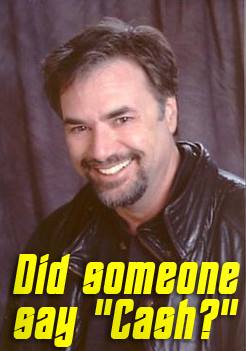Yes, but the very next paragraph in the Van Hise book suggests a fundamental restructuring of the justice system, not merely an elite unit using experimental (fantasy) technology. Per Van Hise, "They also are magistrates, can take testimony, settle cases on the spot, issue subpoenas and the like."
Which, again, doesn't rule out a slightly alternate-world present-day setting. There have been countless shows depicting a "present" that was more advanced than, or institutionally and legally different from, the real world in some specific way. UNCLE supposedly existed in 1964 even though that required a degree of international and East-West cooperation that would've taken decades to build from that point in real life. The
CSI franchise was in an alternate reality where crime-scene analysts participated directly in police investigations even though that would be a gross conflict of interest in real life (you can't perform an unbiased scientific analysis of evidence from a crime you personally investigated).
A lot of speculative fiction is "What if the future turns out this way?" But a lot of it, especially in TV, is "What if the present were already this way?" Again, the key is not the surface technicalities, but Roddenberry's professed intent -- to offer an alternative to outmoded police methods and show the way it
could be done in an ideal present, in hopes of inspiring similar reform in the immediate future. At most, it would've been a very near-future setting indistinguishable from the present except for its one speculative element, which is too narrow a hair to be worth splitting.
It's amusing to me that Roddenberry talks about police with Gestapo powers leading to a fascist civilization in The World of Star Trek, because Van Hise's description of Tribunes sounds very much like the fascist fantasies of a couple of ex-policeman who would like to remove those pesky judges, juries, and lawyers from the equation.
Like many utopian visions, it presumes that human nature can be perfected, that people can be educated well enough to be fully responsible and just in their own right, so that they no longer need checks and balances on their excesses. Roddenberry posited an idealized police force that could be trusted to use its power responsibly and compassionately, and thus could be granted more power as a result.
Again, I'm reminded of
Flashpoint, which was about a Toronto SWAT-style team outfitted with the most advanced weapons but also the most enlightened psychological methods and training for understanding violent offenders and talking them down and finding peaceful solutions and only using lethal force as a last resort. I quite liked it at the time, but today it feels obscenely naive to suggest that such a hypermilitarized police unit could be that good and wise and compassionate and responsible in their use of force. (Now, there's an alternate present for you.)
Roddenberry's claim here—that he didn't pursue further development of the concept in the 80s because there were too many other cop shows—is difficult to take at face value. He was developing Tribunes from 1973-77 when an absolute glut of police shows were on the air including The F.B.I., Adam-12, Police Story, Police Woman, The Rookies, Starsky and Hutch, Barney Miller, Baretta, McMillan & Wife, McCloud, Kojak, CHiPs, The Streets of San Francisco, Toma, Hawaii 5-0, S.W.A.T., Columbo, The Blue Knight, Chopper One, Ironside, Joe Forrester, and Most Wanted. (And that list doesn't include the glut of private eye shows like Mannix, Cannon, Shaft, and others that were on the air during this same period.)
Huh? I quoted the Van Hise passage in comment #138 above. It said, "After several years of trying, in 1977 he realized that TRIBUNES, a futuristic cop show, would never go beyond the development stage." There was nothing about the '80s.
And there was an earlier passage in the book saying that he was working on a cop-show premise that might have been
The Tribunes around the same time he was developing
Star Trek. So it may have been an idea he had in mind since the '60s, tried to develop in earnest in the '70s, but then gave up on when network execs he pitched it to didn't feel it stood out enough from the pack.




